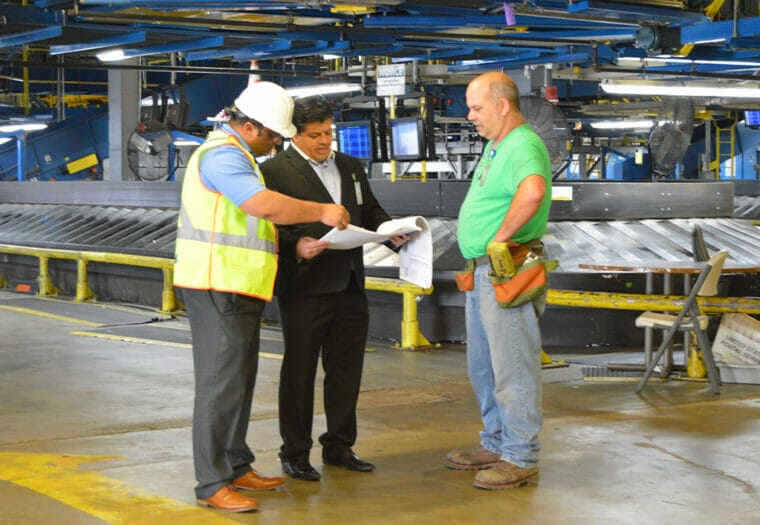News | Jun 08, 2023 | Christyn Binder
Solving Complex Integration Challenges: Why You Need an MSI for Your Next Aviation Project
Airports are becoming increasingly sophisticated and challenging to design, construct, and maintain. Large, complex aviation projects require expert coordination and integration of various systems, including security, IT, and infrastructure. That’s where a Master Systems Integrator (MSI) comes in.
As explained in our previous blog, What is a Master Systems Integrator (MSI) and Why do you Need One? An MSI is an individual or company responsible for integrating and managing various complex systems or sub-systems into a single, cohesive, and functional system to deliver efficient and effective solutions for large-scale projects. In the aviation industry, the MSI’s primary role is to ensure all airport systems, including those for air traffic control, baggage handling, security, and communications are designed, constructed, and integrated seamlessly.
Why do you need an MSI for your next project?
Airports are among the most complex facilities in the world, with thousands of systems, subsystems and components that need to work together seamlessly. This includes everything from baggage handling systems to air traffic control systems, from lighting and heating to security and safety systems. The challenges of designing, building, and operating these systems are significant and require careful coordination and integration. An MSI helps airports to manage these challenges effectively, providing a centralized point of control and coordination for all systems and subsystems.
MSI’s help to streamline project management by coordinating various teams involved in the project, from designers to contractors to system integrators. By providing a central point of coordination, the MSI ensures that all parties are working together seamlessly, thereby reducing the potential for delays or miscommunications.
The Benefits of Engaging an MSI for your Next Project Include:
- Improved Project Management: An MSI helps to improve project management by providing a centralized point of control and coordination for all systems and subsystems. This ensures that all stakeholders are on the same page and that everyone is working towards the same goal.
- Cost Savings: The MSI’s expertise in systems integration can help to reduce costs by optimizing the use of existing systems and technologies. The MSI can identify areas where existing systems can be leveraged, reducing the need for costly new systems or technologies.
- Improved Safety and Security: Safety and security are critical concerns for airports, and the MSI can help to ensure that all security systems are integrated and working together effectively. This includes the integration of CCTV systems, access control systems, and other security measures. The integration of these systems ensure a safe and secure environment for passengers, employees, and visitors.
- Improved Reliability and Maintenance: An MSI can help to improve the reliability and maintenance of all systems and subsystems by ensuring that they are designed, installed, and operated in a coordinated and integrated manner. This can result in fewer breakdowns, fewer disruptions, and lower maintenance costs.
Complex Problem Solving
An MSI can help to solve a wide range of problems during the design, construction, and facility management phases of a large, complex aviation project. Some of the most common problems that an MSI can solve include:
- Design Conflicts: One of the most significant challenges in designing aviation facilities is ensuring that all systems and subsystems work together seamlessly. An MSI can help to identify and eliminate design conflicts, ensuring that all systems and subsystems are compatible and that there are no conflicts or overlaps.
- Construction Delays: Construction delays can be costly and disruptive, and an MSI can help to minimize them by ensuring that all systems and subsystems are installed and integrated in a coordinated and efficient manner.
- Post-Construction Disruptions: Even after a facility is built, there can be disruptions caused by conflicts or inefficiencies in the systems and subsystems. An MSI can help to identify and eliminate these disruptions, ensuring that the facility operates smoothly and efficiently.
- Maintenance Issues: Maintenance is a critical concern for airports, and an MSI can help to ensure that all systems and subsystems are designed, installed, and operated in a way that makes maintenance easier and more cost-effective.
In sum, the role of a Master Systems Integrator (MSI) is vital for large, complex aviation projects. Airports require the expertise and coordination provided by an MSI to ensure the seamless integration of all systems and subsystems. The benefits of an MSI for airports are numerous, including improved project management, cost savings, improved safety and security, and improved reliability and maintenance. Additionally, an MSI can solve a variety of problems during the design, construction, and facility management phases. With the help of an MSI, airports can effectively manage the complexities of their projects, ensuring the smooth and efficient operation of their facilities for years to come.



